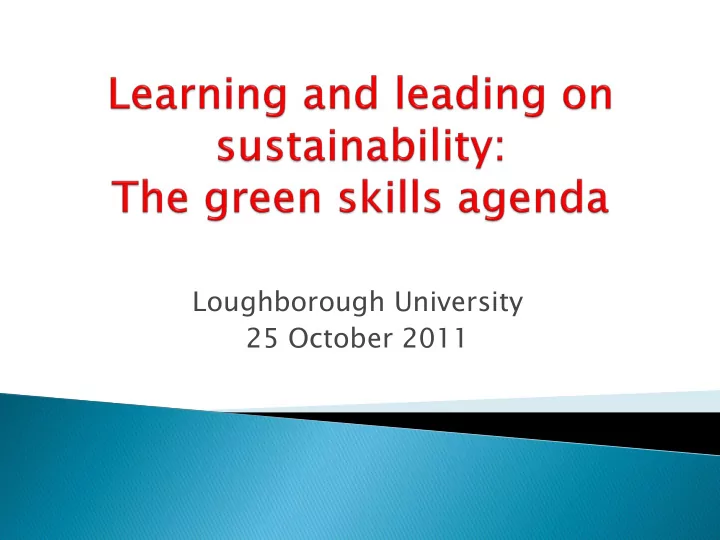

Loughborough University 25 October 2011
Grahame Boocock and Laurie McAulay School of Business & Economics Loughborough University
Research into what SMEs are doing and why, and hence what SMEs want/need from HE
Focus on entrepreneurial rather than lifestyle firms Timmons (1989): … initiating, doing, achieving, and building an enterprise or organisation, rather than just analysing or describing one. It is the knack of sensing an opportunity where others see chaos, contradiction and confusion At the core of SME activity is seizing opportunities, and …
Every business activity (that ever was and ever will be) can be valued in relation to three factors: Value = P * S * E
Value = Problem times … Solution times … Quality of entrepreneurship (management)
Thoreau: if you build a better mousetrap, then the world will beat a path to your door, but …
What makes your product or service better/different than what is out there? Ideally, your product or service will solve important, valuable problems for customers who have money, who will pay well and will buy more soon! Is the „pain‟ acute enough for the target market to buy now? Must give customers a compelling reason to change.
Essence is that a collection of skills is required, including … Functional skills, leadership, networking, negotiating, juggling balls in the air, etc. Learning process is complex and ongoing Key attributes vary as venture develops … … and across different business sectors Many contributors - individual entrepreneur, employees, teams or formal/informal groupings
Research into what SMEs are doing and why (interviews conducted over 2009/11) ; Over 40 interviews, split into 4 broad groups; Semi-structured interviews using prompts; Taped, transcribed and analysed using nVivo.
Regulatory group (10): SMEs that have signed Climate change levy agreements or that are involved in the EU ETS. “Greenhearts” (14): SMEs with a mission to respond to climate change. “Others” (10): SMEs who might be sympathetic to the green agenda and/or have taken some actions (but do not have a mission). Large companies (7): to draw out contrasts, identify role models, etc.
Focus here is the exploitation of market opportunities (created by regulation and/or the climate change „zeitgeist‟) Solving problems by providing new products and services Or, helping firms deliver solutions in a different way Or, helping firms deliver solutions more effectively and efficiently
Brompton Bicycles
Wind turbines: “the market is set to be very healthy both here and in the US and in the rest of Europe ... there's a surprising number of people with the land and the money and the wind to make good use of these things”.
21
Lighting: “the cost of installing energy saving lights has a pay-back of between 1 and 2 years; that‟s what makes it very attractive [to our potential customers]”.
Energy monitoring, growing business; CEO committed to climate change and “passionate” about what he does; Takes information from meters, interprets information and follows a model to secure behaviour change; CEO cannot market his service through climate change arguments – regulation and cost savings justify securing his services (i.e. compelling reason to change).
Energy consultants to the industry (we‟re the builder‟s friend); It‟s our mission to make better buildings, and we can make money for our customers (and us); Advise on energy and water efficiency, and how to maximise efficiency in existing infrastructure (for example, crisp manufacturer recycles oven heat into the heating system); “We can‟t fix everything, but the little bits our clients do all contribute to a ginormous task!”
Manufacturing: “There‟s an opportunity to save money plus, obviously, every company wants to be more environmentally friendly or energy efficient. I personally like saving money and being more environmentally efficient. If I had the money, I‟d have a wind farm down the bottom, heat recovery off the ovens … you know, I‟d spend millions.”
SMEs are able to benefit in numerous ways, including: saving money, efficiency, reputation, growth and launching new products/services.
Preaching to the converted? OU ¼ Survey of Small Business in Britain: Considerable proportion of SME community are sceptical about benefits of „greening‟; too much investment required and long payback; disruption to business; being green helps our PR but as soon as we increase prices, we lose customers; etc
Requires critical thinking and individuals with the ability to operate in an ethos of independence, freedom and risk taking Flexible thinkers who can identify the problems faced by customers, come up with solutions, etc. Individuals prepared to engage in life-long learning
Lif ife in in an SM SME? E?
Recommend
More recommend